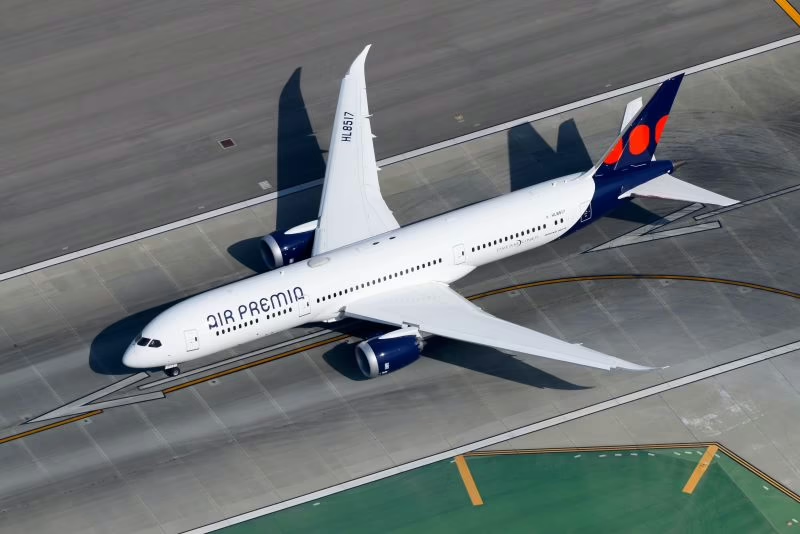Daily Memo: New Players Stake Claims In South Korea’s Long-Haul Market

Two of South Korea’s smaller airlines are expanding the widebody operations they launched during the past two years, providing a degree of home-based long-haul competition to the dominant Korean carriers.
Air Premia plans to boost its fleet of Boeing 787s in 2023 to further its international ambitions, after launching its longest route—to Los Angeles—in October 2022. Meanwhile, LCC T’Way started its first long-haul route—to Sydney—in December 2022, using Airbus A330s it added earlier in the year.
The Air Premia and T’Way long-haul moves are obviously not enough to shake up South Korea’s overall international market share. However, they will be significant on the specific routes they have entered, and both airlines are likely to expand to more international routes.
These developments have some positive aspects for Korean Air, which has been working with regulators in the U.S. and elsewhere to assure them that there is enough competition in these markets to allow its proposed merger with Asiana to go ahead.
Air Premia is a full-service carrier based at Seoul Incheon International Airport (ICN). Although it was under development before COVID-19 emerged, the airline debuted during the middle of the pandemic. It gained its air operator’s certificate in July 2021 and began flights in August 2021.
The airline operates three 787s, with the third introduced on Oct. 29, 2022. It is due to add another two 787s in the first half of 2023, and the carrier has discussed its ambition to raise its fleet to 10 by 2025.
A major step occurred on Oct. 29, 2022, when Air Premia started five-times weekly service between Seoul and Los Angeles. The airline was already operating a Europe route—a weekly charter flight to Ankara, Turkey.
The carrier had a 14.5% share of weekly seats in the Seoul-Los Angeles market for the week of Jan. 9, according to data from CAPA and OAG. Asiana accounted for a 44.2% share, and Korean Air 41.3%.
Air Premia has also been building its Asian network, which could help provide some degree of feed to its long-haul routes. It operates to Singapore and Ho Chi Minh City, Vietnam, and it began flights to Tokyo Narita Airport on Dec. 23, 2022.
T’Way also has a new fleet of three widebody aircraft. In this case they are A330s, however. Another difference is that while Air Premia only has widebodies, T’Way already had a well-established narrowbody fleet. The carrier operates 25 737-800s and one 737-8, which are mainly deployed on international routes.
T’Way introduced the first of its A330s in February 2022, with the second arriving in April and the third in May. It has used them in various parts of its network, including its Japan routes.
On Dec. 23, T’Way launched its first true long-haul route, a flight between Seoul and Sydney operated with its A330s. The route has started with four weekly frequencies.
T’Way offers some features on its long-haul route that are more typically found in full-service carriers. These include free meals, free checked bags and 12 lie-flat business class seats.
The route between Seoul and Sydney has become much more highly contested, with the addition of not only T’Way but also two Australian carriers. LCC Jetstar launched Sydney-Seoul flights in November 2022, and parent Qantas started the same route in December. Korean Air had a 31.6% share of weekly seats in the Australia-South Korea market for the week of Jan. 9. Asiana was next with 27.5%, and T’Way had the third-largest share with 15.9%.
T’Way is likely to expand its widebody routes, as it has discussed plans to add more A330s in 2023.
Despite their latest moves, Air Premia and T’Way remain some way behind the leaders in South Korea’s overall international market. T’Way ranks fifth in terms of international weekly seats with 8.2% of the total. Air Premia ranks 15th with a 0.9% share. These rankings include overseas-based airlines.


